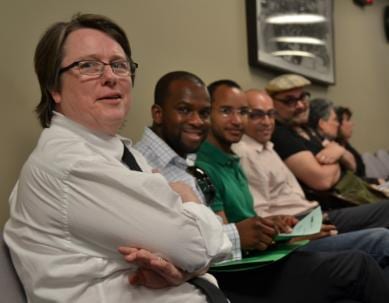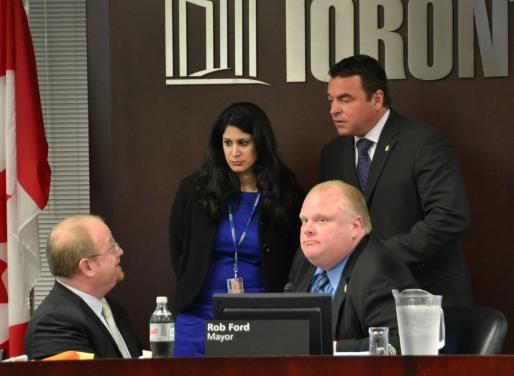
Team Pride waiting for a chance to depute on May 24. Credit: Andrea Houston
Funding for Pride Toronto (PT) is conditional and will be determined after this year’s parade, Councillor Giorgio Mammoliti told media following a City of Toronto executive committee meeting on May 24.
The committee heard from more than 45 speakers, 26 in support of PT, during the eight-hour meeting. In the end, no motion was brought forward that would have made funding contingent on a guarantee by PT that the group Queers Against Israeli Apartheid (QuAIA) take no part in any festival events, anywhere, all week.
A city manager’s report, released in April, confirmed that the phrase “Israeli apartheid” – and by extension QuAIA’s participation in Pride celebrations – does not violate the city’s anti-discrimination policy. Those who oppose QuAIA’s participation have argued from the outset of the controversy that it does, and that, therefore, makes PT ineligible for city funding.
It’s good news for PT. But Ward 27 Councillor Kristyn Wong-Tam warns, “Council rules supreme. So at any time there could be a motion on the floor of council for a vote in June without notice. Then we would have to open it up and go through a big debate all over again, this time without public consultation…. But it seems unlikely because council voted unanimously to receive the report. I was scared because some councillors had their knives out and had made some threats.”
After the vote, Mammoliti told Xtra he still anticipates that QuAIA will make an appearance during Pride Week. Even if PT organizers aren’t aware, he says, he plans to hold PT responsible.
“QuAIA better stay away,” he says. “If they think they can do what they want at the expense of the taxpayer, they’re wrong.The City of Toronto isn’t going to fund an organization that wants to cause trouble. That’s not what the taxpayers want to do…. This councillor will defend the Jewish community, and I’ll do it in an aggressive way.”
Mammoliti says the festival won’t get a penny until after the event.
“Some of us will be watching carefully, and we’ll determine later whether or not they should get funds,” he says.
In fact, as Wong-Tam says, a majority of councillors would have to vote to claw back PT funding.
QuAIA members have already announced that the group will not participate in the 2011 Pride parade. PT co-chair Francisco Alvarez says he believes that QuAIA is sincere. But he refuses to provide Mammoliti with the written guarantee he demanded earlier this spring.
“In our view, they are trying to make us discriminate against a group,” says Alvarez.
Alvarez told the executive committee that without the city’s support, PT could face bankruptcy and would most likely have to withdraw from WorldPride, scheduled to be held in Toronto in 2014.
“It’s really been rough on everyone, but democracy is not an easy process,” he says.
Many of those who spoke against QuAIA at the meeting said they are Jewish, or were representing Jewish groups. There were several members of the Jewish Defense League, an organization dedicated to “protect Jews from anti-Semitism by whatever means necessary.” The group has already promised to protest at the PT offices every Friday until Pride Week.
During the meeting, Mammoliti was joined by Mayor Rob Ford and councillors James Pasternak and David Shiner in questioning some who spoke in favour of QuAIA about hate speech.The committee was repeatedly reminded that there is nothing anywhere in Canadian jurisprudence to suggest the phrase constitutes hate speech. Also, the city manager’s report determined it doesn’t break any city rules.
In fact, free speech, including the apartheid analogy, is protected under Israeli law. And the term and the validity of the analogy has been part of the discourse at all levels – political, academic, activist, vernacular – inside and out of Israeli society and around the world for decades.
Still, at one point Mammoliti argued that even though the phrase isn’t legally hate speech, it is still “hurtful.”
“I think it’s hate speech. I don’t care what the staff report says,” he said. “We’ve all suffered from hate. I’m Italian. I’ve been called a wop.”
Toward the end of the meeting, Councillor Peter Milczyn spoke up in favour of free expression at Pride.
“Once you censor one group, one idea, even if you disagree with it violently, it starts a slippery slope. Because what will it be next, the next group?”
In 2010, PT received a $123,807 grant and about $250,000 worth of in-kind services from the city, including garbage cleanup and policing. According to a 2009 economic impact study conducted for PT by Enigma Research,
the festival drew $136 million in spending during the 2009 Pride celebration; $94 million of that came from visiting tourists.
“These economic benefits are exceptional,” said Enigma’s Michael Harker in a Pride Toronto press release at the time. “The estimates are considerably higher than we have seen at many similar-sized festivals and sporting events throughout North America.”
Watch QuAIA’s deputation video. QuAIA member Tim McCaskell says mayor Ford cut the video off before it was finished, deputants were each given only four minutes to speak.
QuAIA Deputation – Pride 2011 from John Greyson on Vimeo.
Read the deputation made by Nick Mulé, founder and chairperson of Queer Ontario:
And Queer Ontario’s press release on the matter:
Pride Toronto Diversity and Democracy
And QuAIA member and former board member of Pride Toronto Elle Flanders’ deputation.

 Why you can trust Xtra
Why you can trust Xtra


